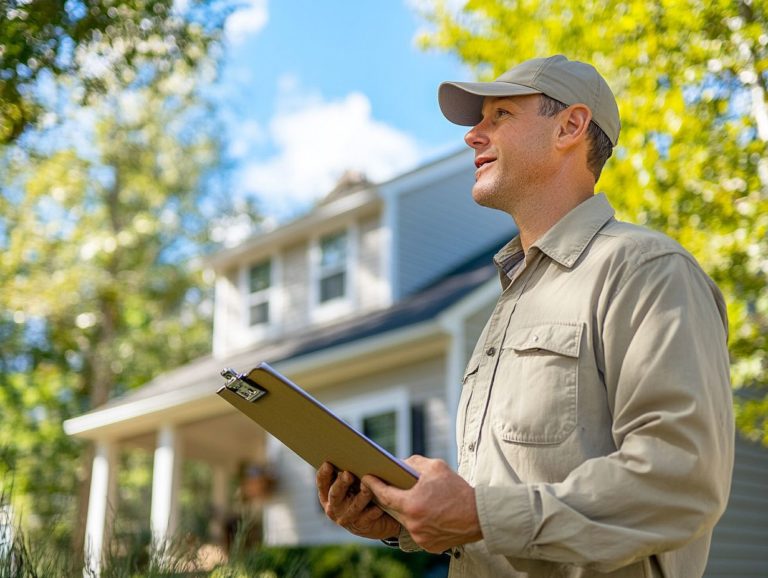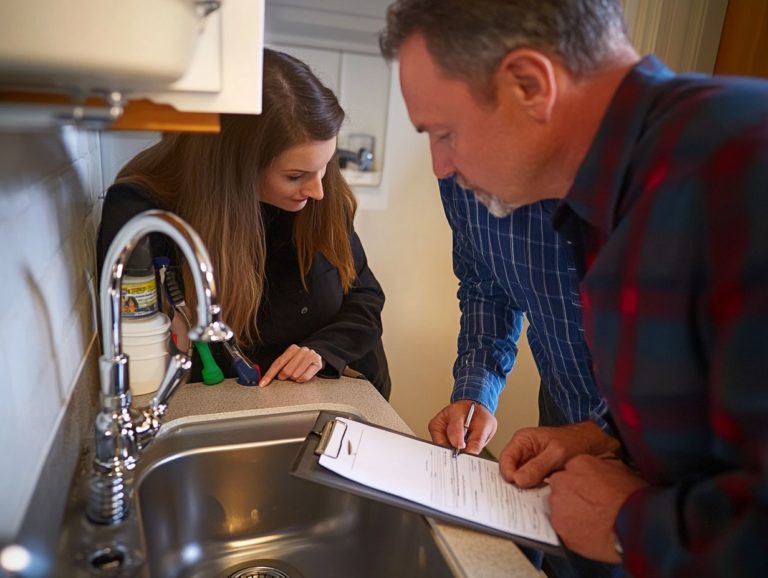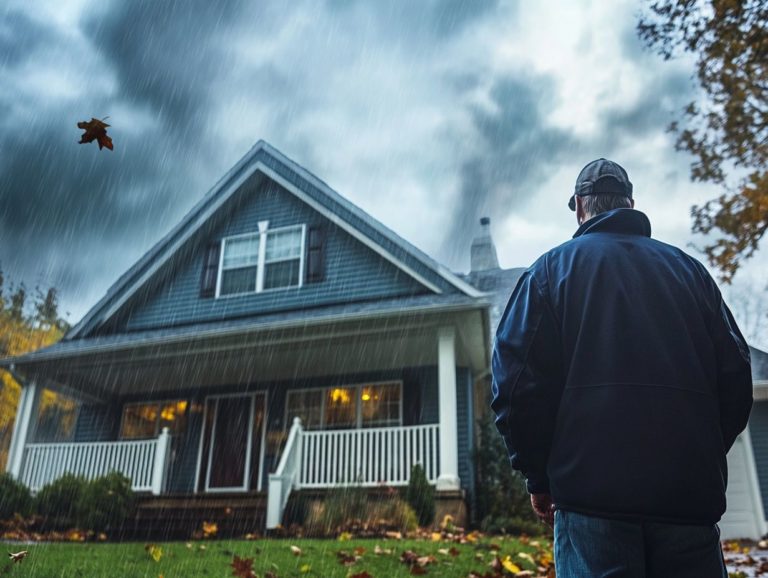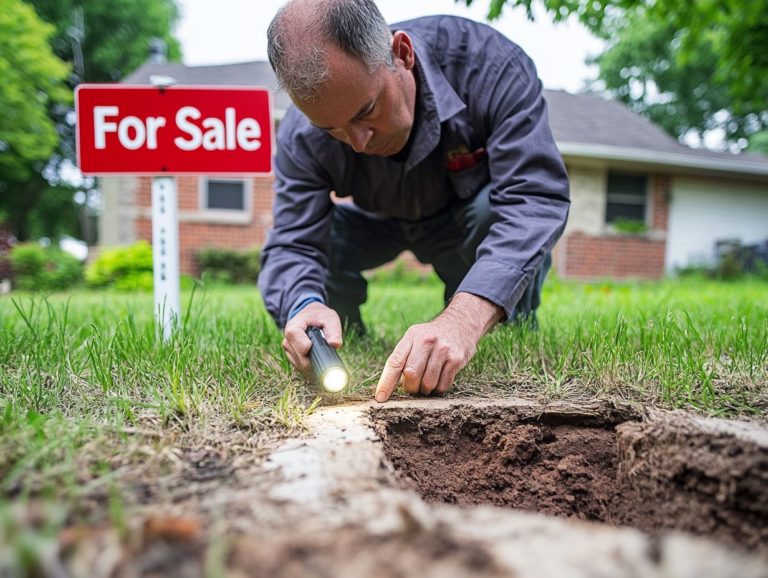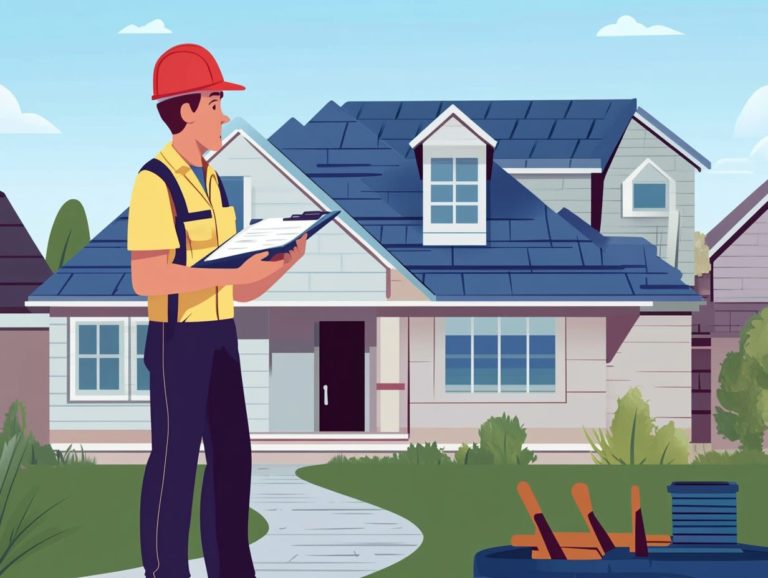How Seasonal Changes Affect Home Inspections
Seasonal changes present unique challenges and opportunities for home inspections. It is essential for homeowners and inspectors to understand these variations.
Every season brings its own set of scenarios, from the effects of winter weather on roofs to the springtime moisture that can lead to mold growth.
This article covers what to expect during seasonal inspections, how weather influences the process, and offers practical tips tailored for you, whether you are inspecting or maintaining a home.
It also highlights common issues that may arise and emphasizes the benefits of regular inspections. This ensures your home remains safe and sound throughout the year.
Contents
- Key Takeaways:
- Understanding Seasonal Changes in Home Inspections
- Impact of Weather on Home Inspections
- Preparing for Seasonal Inspections
- Common Issues Found During Seasonal Inspections
- Benefits of Seasonal Inspections
- Frequently Asked Questions
- How do seasonal changes affect home inspections?
- Do I need to schedule a specific type of home inspection based on the season?
- What are some common seasonal issues to look out for during a home inspection?
- How can I prepare my home for a seasonal home inspection?
- What should I do if a seasonal home inspection reveals issues?
- Are there any extra costs associated with seasonal home inspections?
Key Takeaways:

- Tailor your home inspections to the season for the best results.
- Check roofs after summer storms to catch hidden damage.
- Weather conditions greatly impact the home inspection process.
- Take necessary precautions when preparing for seasonal inspections.
- Seasonal inspections can reveal common issues like roof damage and HVAC malfunctions.
- Regular inspections can prevent costly repairs and ensure safety.
Understanding Seasonal Changes in Home Inspections
Understanding seasonal changes in home inspections is essential for homeowners in Florida. The state s distinctive weather patterns can greatly affect property integrity.
As the seasons shift from humid summer months to cooler winter temperatures, several key aspects of home maintenance come into focus, including:
- Air conditioning systems
- Roof inspections
- Pest control
- And more
By recognizing how these seasonal variations impact inspection outcomes, you can implement timely actions that ensure your home remains safe, efficient, and structurally sound throughout the year.
What to Expect During Different Seasons
Different seasons bring distinct expectations for home inspections. You need to adapt your maintenance strategies accordingly.
As summer approaches, it s essential for you to prioritize inspecting the roof for any damage caused by heat and humidity. Ensure that your air conditioning systems are functioning efficiently to keep your home comfortable.
When fall arrives, check your gutters for debris accumulation. Prepare your HVAC system for the colder months ahead.
Winter calls for a keen focus on plumbing to prevent freezing pipes. Regular roof inspections are crucial to identify potential ice dam issues.
With the arrival of spring, conduct a thorough inspection of both your interior and exterior spaces. Address any pest control needs and examine your landscape’s drainage system to prevent unwelcome water buildup.
Impact of Weather on Home Inspections
Florida s weather plays a crucial role in home inspections. The diverse climate conditions present unique challenges throughout the inspection process.
How Weather Conditions Can Affect the Inspection Process

Weather conditions shape the home inspection process, often influencing both the thoroughness and outcomes of evaluations.
Heavy rainfall or hurricane conditions can limit visibility, making it challenging for certified inspectors to adequately assess critical areas of a property. Pooling water can obscure underlying structural issues, and strong winds may pose safety risks, preventing inspectors from using ladders to check roofs or gutters.
To tackle these challenges, experienced professionals typically adapt their approaches. They may use drones to inspect hard-to-reach areas or employ thermal imaging. This allows them to conduct a comprehensive evaluation while prioritizing safety and accuracy.
As a result, you can feel confident in making informed decisions, even when the weather is less than ideal.
Preparing for Seasonal Inspections
Preparing for seasonal inspections requires care from you as a homeowner. This ensures your property is well-equipped for comprehensive assessments, especially in a state like Florida, where weather conditions can shift unexpectedly.
Don’t miss these essential tips to keep your home safe and sound! Get started on your seasonal inspection today to protect your home and family!
Tips for Homeowners and Inspectors
Effective communication and organization between homeowners and inspectors are essential for successful seasonal inspections and maintenance planning.
To facilitate a seamless inspection process, you must take proactive steps such as decluttering your spaces and ensuring access points are clear for inspectors. This saves time and allows for a more comprehensive assessment of your property.
Inspectors can enhance their evaluations by preparing a checklist tailored to seasonal concerns. For example, consider roof and gutter maintenance in the fall or HVAC system checks in the spring.
By providing detailed inspection reports that include recommendations for seasonal maintenance tasks, both homeowners and inspectors can collaborate to uphold your property s condition and minimize potential future issues.
Common Issues Found During Seasonal Inspections
Seasonal inspections frequently uncover common issues that, if neglected, can escalate into expensive repairs and serious concerns for homeowners.
Taking proactive measures during these inspections can save you time and money in the long run.
Identifying and Addressing Seasonal Problems
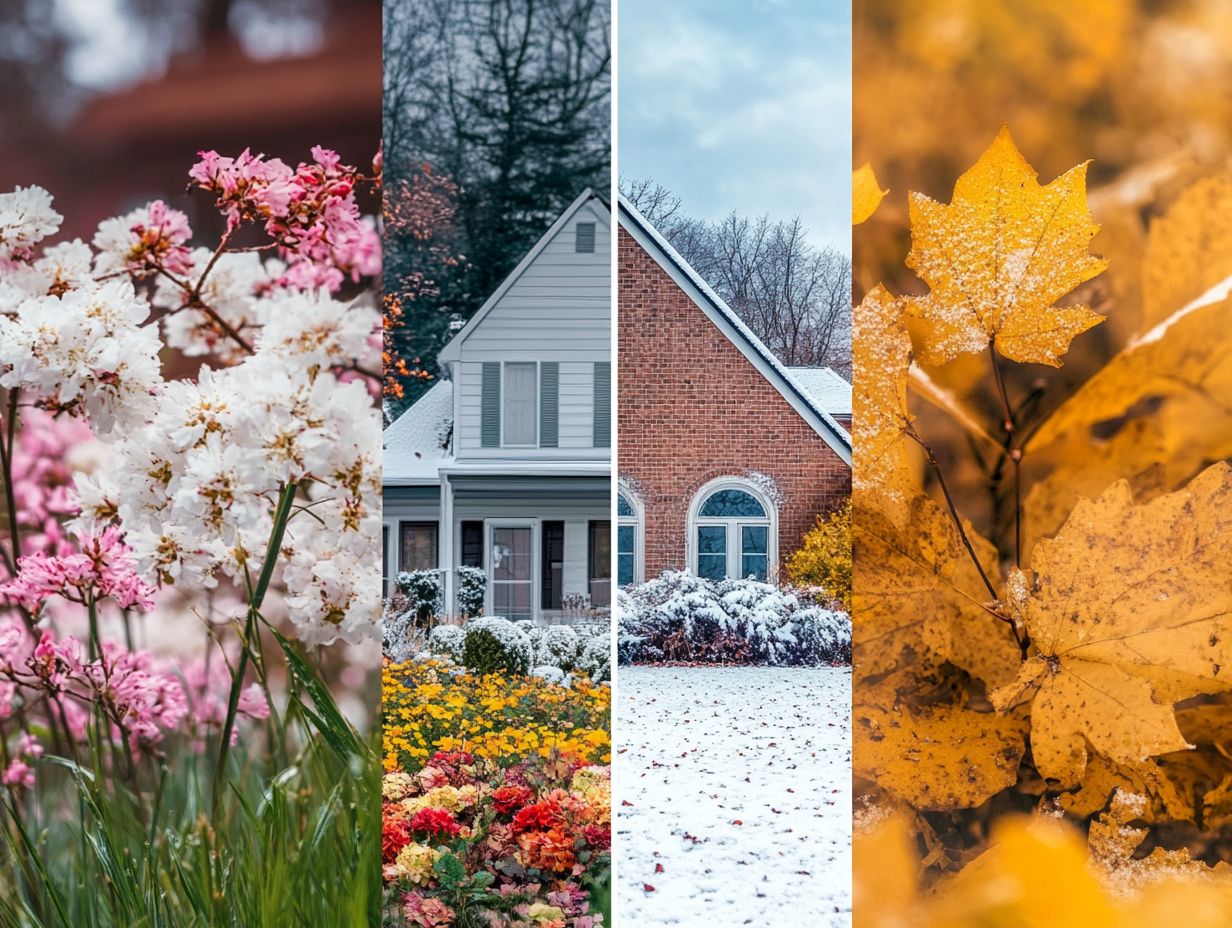
Identifying and addressing seasonal problems during inspections is crucial for maintaining your home’s structural integrity. You and your inspector can use various proactive methods to spot potential issues.
Conduct thorough visual assessments. Don t underestimate the power of special cameras that can detect leaks by showing temperature differences.
You must regularly check your drainage systems, especially after heavy rainfall. This helps spot pooling water or blockages that could lead to significant structural concerns down the line.
Assessing your air conditioning performance through temperature readings and ensuring that vents are clear can greatly enhance energy efficiency.
By recognizing these issues early on, you can take actionable steps like scheduling repairs or upgrades to protect your home from more extensive damage.
Benefits of Seasonal Inspections
Seasonal inspections offer numerous advantages for homeowners. They enhance property management, boost energy efficiency, and facilitate early detection of potential issues before they escalate.
Why Regular Inspections are Important
Regular inspections are essential for maintaining your home effectively. They allow you to stay ahead of potential issues and keep your property in prime condition.
When certified inspectors carry out these evaluations, you gain a comprehensive understanding of your property’s current state and can pinpoint areas needing attention.
This proactive strategy helps preserve both the structural integrity and aesthetic appeal of your home while enhancing its value over time.
Insights from these assessments help buyers make informed decisions. This promotes transparency and reduces unexpected repairs.
Ultimately, regular inspections cultivate better property management practices, empowering homeowners and potential buyers to make savvy choices that protect their investments for years to come.
Frequently Asked Questions
How do seasonal changes affect home inspections?
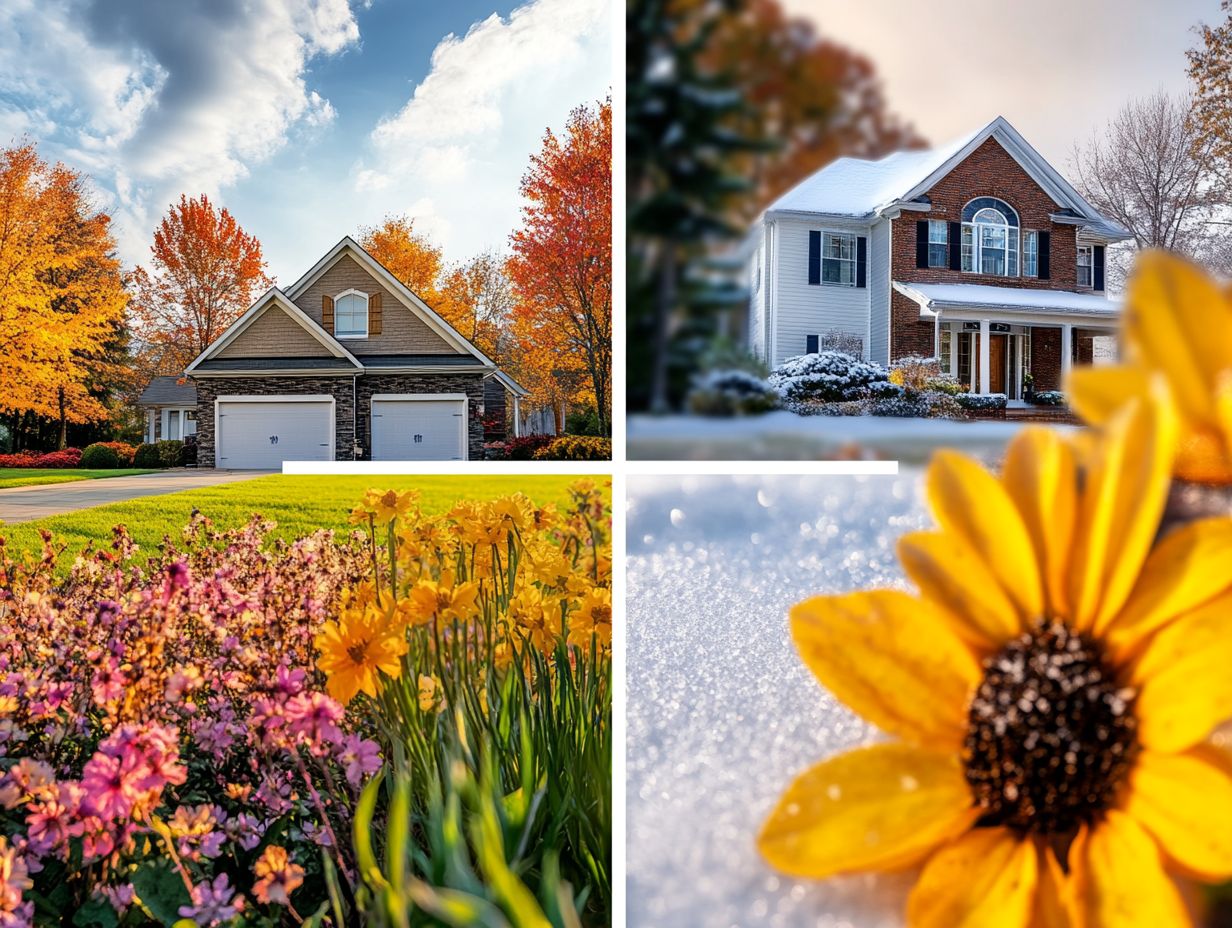
Seasonal changes can affect home inspections. For example, during colder months, exterior features like the roof and gutters may be hard to inspect due to snow or ice. In warmer months, foliage and landscaping can hide potential issues. Extreme temperatures can affect the functioning of systems like HVAC or plumbing.
Do I need to schedule a specific type of home inspection based on the season?
While certain seasonal changes may require additional inspections, such as a roof inspection after heavy snowfall, the type of home inspection needed typically depends on the age and condition of the home rather than the season. It’s important to consult with a professional inspector to determine the appropriate type of inspection for your specific situation.
Don t wait until it s too late! Regular seasonal inspections can save you from costly repairs.
What are some common seasonal issues to look out for during a home inspection?
In colder months, pay close attention to your heating system, insulation, and how well air moves through your home. In warmer months, check your air conditioning, outdoor drainage, and ensure windows and doors seal properly.
Seasonal changes can also uncover problems with the roof, gutters, and foundation. A thorough inspection of these areas is essential.
How can I prepare my home for a seasonal home inspection?
To get ready for a seasonal inspection, take a few simple steps. In winter, clear snow and ice from the exterior to allow for a complete check.
In summer, trim back overgrown plants that may block important areas. Make sure utility spots like the attic and basement are accessible for a thorough review.
What should I do if a seasonal home inspection reveals issues?
If your inspection finds problems, act quickly to tackle them. This may mean scheduling repairs or bringing in specialists for further assessments.
Consult your real estate agent or inspector to understand how severe the issues are and how they might affect your home’s value.
Are there any extra costs associated with seasonal home inspections?
While specialized inspections, like checking your roof after heavy snowfall, may incur extra costs, the overall inspection price should remain stable throughout the year. However, factor in potential repair costs that could arise from seasonal problems identified during the inspection.

